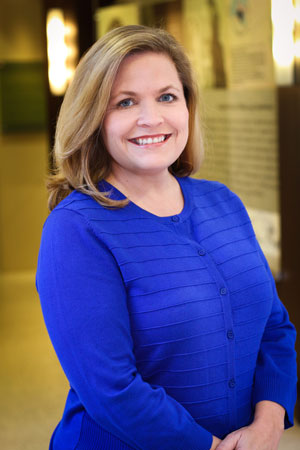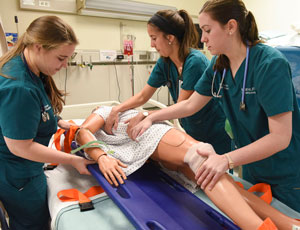In honor of Health Care Simulation week from Sept. 17-21, Penni Watts, PhD, RN, CHSE-A, answered a few questions about the importance of simulation at UAB School of Nursing.
Health Care Simulation Week, a time to celebrate health care simulation professionals and advocate for the importance of simulation, is from Sept. 17-21, 2018. To celebrate, UAB School of Nursing Professor Penni Watts, PhD, RN, CHSE-A, and alumna Denesha Osborne (MSN 2018) answered a few questions about simulation, its role at UAB School of Nursing and how it can impact education and health care.
 Penni Watts, PhD, RN, CHSE-A
Penni Watts, PhD, RN, CHSE-APenni Watts, PhD, RN, CHSE-A
Q: What inspired your interest in health care simulation?
A: When I started learning about simulation, it was all very new to me, but then I went to my first conference and heard how impactful a simulation experience could be. When I returned home, I tried out simulation, and I have not turned back since then. It brings the classroom to life!
Q: What does simulation mean to you?
A: Simulation means that learners can have an opportunity to test out what they have learned prior to caring for patients. Simulation can improve patient safety!
Q: What is the importance of simulation in nursing?
A: Nursing school is very rigorous, and students learn an enormous amount of information in a short amount of time. Simulation gives students clinical experiences that they may not have when doing their clinical rotations, and it can help learners apply what they have learned. Can you learn how to drive a car by reading the book? No — you have to go practice in many different settings. Simulation can do this for nursing. It also benefits students because if they struggle in a simulation, that’s OK. We are able to have a debriefing after the experience to discuss and dissect what happened in the simulation and to help learners develop new strategies.
Q: How is UAB School of Nursing on the leading edge of simulation?
A: The SON if fortunate that we have many faculty who are highly-trained in simulation and in many nursing specialties. For more than 10 years, we have also been incorporating many types of simulation in a physically small place for graduate and undergraduate students. With our new simulation center space, however, the sky is the limit for what we can do in the future! We have five high-fidelity simulation rooms and a nurses station that allow for a variety of simulation experiences.
Q: Are there any common misconceptions for simulation? If so, what are they?
A: There are a few misconceptions with simulation. First off, simulation is not the answer to every educational conundrum, and sometimes another educational option is best. Simulation also does not have to be complicated — simple can be the best and most impactful. In fact, there are many low resource simulations that are very powerful in teaching nurses. You don't always need the most expensive mannequin to be most effective.
Simulation is also much more than just putting a mannequin in a bed and changing vital signs. It takes careful thought and planning. We are excited that now we have the INACSL (International Nursing Association for Clinical Simulation and Learning) Standards of Best Practice which provide guidance for implementing a successful simulation.
Q: What is one of your favorite stories or experiences involving simulation?
A: My favorite story is one I hear often during the year — students will call me and share that while they were caring for patients at the hospital, they were able to apply what they learned in a simulation experience in their care of the patient. When learners can say simulation impacts their practice, I know have done my job and I have been successful. And if my simulation work can touch one patient, save one patient and impact nursing education, I can sleep at night!
Denesha Osborne, MSN
Q: What does simulation mean to you?
A: Simulation, for me, provides an opportunity to get hands-on experience in a safe environment.
Q: What is the importance of simulation in nursing?
A: Simulations provide nurses and nursing students the opportunity to make mistakes and ask questions without fear of judgment or risk of harming a patient.
 Trauma Simulation
Trauma SimulationQ: How have you benefited from simulation?
A: Simulations gave me the opportunity to deal with situations that I may not commonly see in my area of practice. While I may not run into the situations on a regular basis, if the situation arises, I have some basic knowledge on how to handle it thanks to simulation.
Q: How is UAB School of Nursing on the leading edge of simulation?
A: UAB SON provides some of the most high-tech simulations I have seen throughout the numerous hospitals I have worked. Having mannequins that function similar to real-life patients is so helpful when translating things learned in the sim lab to the bedside.
Q: What is one of your favorite stories or experiences involving simulation?
A: My favorite experience in simulation was doing the interdisciplinary simulation. Having the opportunity to practice working with medical students, a respiratory therapist, social work and other disciplines was a very helpful experience that provided a peek into what day-to-day life is like working as a nurse.
For the School's Facebook Live video with the Society for Simulation in Healthcare, click here.
To watch a 360-degree video of the new competency suites, click here.